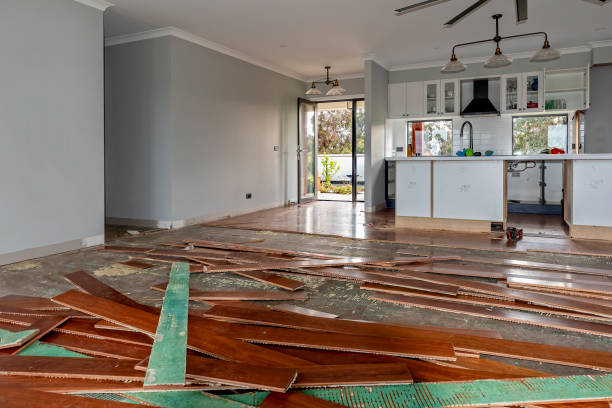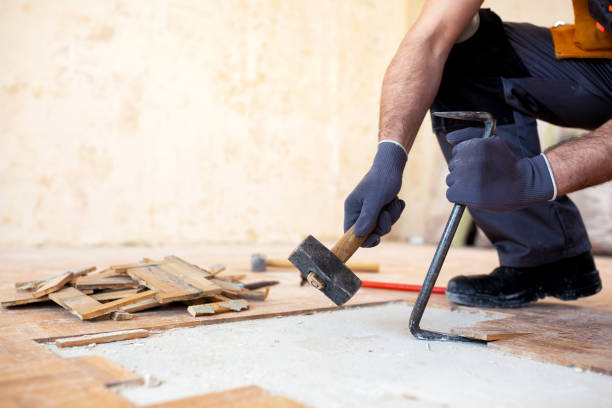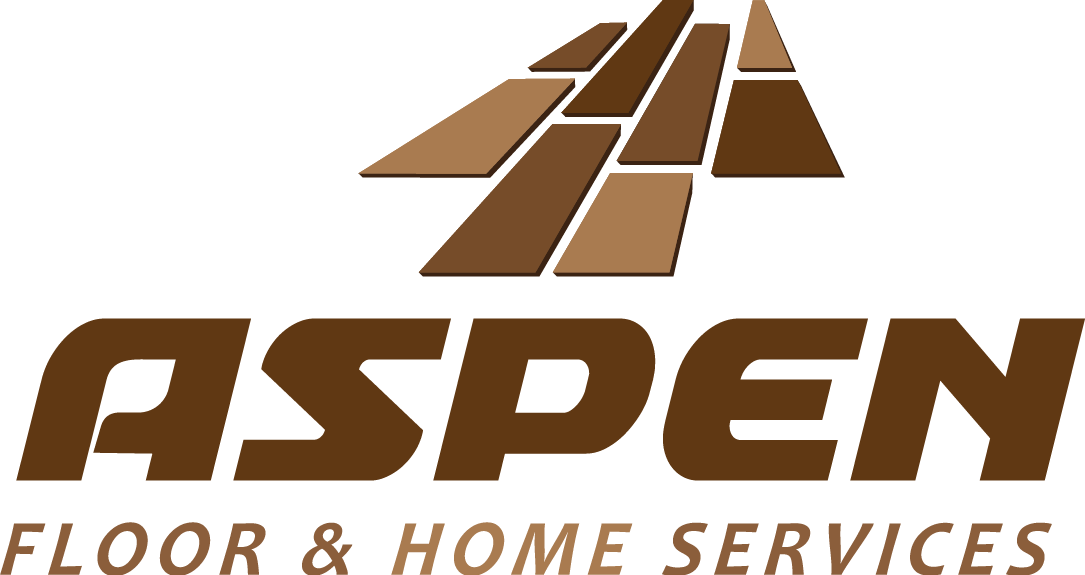When it comes to existing hardwood floor removal, Denver homeowners face unique challenges due to the city’s dry climate and strict disposal regulations.
Removing old hardwood flooring can be a dusty, time-consuming process that requires special care to protect your home and subfloors.

As a locally owned and operated flooring company with several years of experience serving the Denver metro area, we’ve developed proven techniques for safe, efficient, and clean hardwood floor removal.
We’re here to share our top 3 expert tips to ensure a smooth, dust-free process that will prepare your space for beautiful new flooring.
Expert Tips for Removing Nails, Staples, and Adhesives from Hardwood Floors in Denver
One of the most tedious aspects of existing hardwood floor removal is dealing with the nails, staples, and adhesives that hold the planks in place.
Improper removal techniques can damage your subfloor, create extra dust, and slow down the entire process.
To remove fasteners and adhesives efficiently, follow these expert tips:
| Fastener Type | Removal Technique | Tools Needed |
|---|---|---|
| Nails | Pry up planks with a flat bar, then pull nails with a claw hammer or pliers | Flat bar, claw hammer, pliers |
| Staples | Use a flat screwdriver to lift staples, then remove with pliers or a staple remover | Flat screwdriver, pliers, staple remover |
| Adhesives | Use a floor scraper to remove as much adhesive as possible, then sand remaining residue | Floor scraper, sander, adhesive remover (if needed) |
By using the right tools and techniques, you can remove fasteners and adhesives without damaging your subfloor or creating unnecessary dust.
How to Keep Denver Homes Clean During Hardwood Floor Removal
Dust control is a top priority during existing hardwood floor removal, especially in Denver’s dry climate where airborne particles can spread quickly.
Minimizing dust not only keeps your home cleaner but also protects your health and makes the cleanup process much easier.
Here are some proven strategies for controlling dust during hardwood floor removal:
- Seal off the work area with plastic sheeting and tape to contain dust
- Use a dust containment system with HEPA filtration to capture airborne particles
- Cover vents, doorways, and other openings to prevent dust from spreading
- Wear protective gear, including a dust mask and safety glasses, while working
- Clean up dust and debris regularly using a vacuum with a HEPA filter
| Dust Control Method | Effectiveness | Key Benefits |
|---|---|---|
| Containment Barriers | High | Isolates work area, prevents dust from spreading |
| HEPA Filtration Systems | Very High | Captures up to 99.97% of airborne particles |
| Regular Cleaning | Moderate to High | Removes settled dust, improves air quality |
By implementing these dust control measures, you can significantly reduce the amount of dust and debris generated during the hardwood floor removal process, keeping your Denver home cleaner and healthier.
Safe Disposal of Old Hardwood Flooring in Accordance with Denver Regulations
Once you’ve removed your old hardwood flooring, it’s crucial to dispose of it properly in accordance with Denver’s waste management regulations.
Improper disposal can lead to fines and environmental hazards, so it’s essential to follow the city’s guidelines.
Here are the key steps for safe and compliant disposal of old hardwood flooring in Denver:
| Disposal Step | Details | Resources |
|---|---|---|
| Check for Hazardous Materials | Inspect flooring for asbestos, lead, or other hazardous substances; if found, contact a specialized disposal service | Colorado Department of Public Health and Environment |
| Sort and Separate Materials | Separate hardwood from other debris like nails, staples, and adhesives for proper disposal | Denver Public Works Recycling Guide |
| Recycle or Dispose at Authorized Facilities | Take sorted materials to a registered construction and demolition waste facility or recycling center | Denver Construction and Demolition Waste Recycling Facilities |
By following these guidelines and working with a reputable flooring contractor, you can ensure that your old hardwood flooring is disposed of safely and responsibly, in full compliance with Denver’s regulations.

Why Expert Hardwood Floor Removal Matters for Denver Homeowners
Removing existing hardwood flooring is a complex process that requires skill, experience, and specialized equipment to do properly.
While DIY floor removal may seem like a cost-saving option, it can often lead to costly mistakes, damage to your subfloors, and potential health hazards from improper dust management.
Here are just a few reasons why hiring expert hardwood floor removal professionals is a smart investment for Denver homeowners:
| Benefit of Professional Removal | Why It Matters | Long-Term Impact |
|---|---|---|
| Safe and Efficient Process | Experts have the tools, knowledge, and experience to remove flooring quickly and safely | Minimizes risk of injury, property damage, and project delays |
| Dust Control and Cleanliness | Professionals use advanced dust containment systems to keep homes clean | Protects your health, reduces cleanup time, and prevents dust from settling in your HVAC system |
| Subfloor Protection | Proper removal techniques and pre-removal inspections help avoid subfloor damage | Ensures a smooth, level surface for new flooring and prevents costly repairs down the line |
By trusting your hardwood floor removal project to experienced professionals, you can ensure a smoother, safer, and more efficient process that sets the stage for beautiful new flooring and protects your home’s value.
As Denver’s go-to experts for existing hardwood floor removal, we’re committed to delivering exceptional results while minimizing dust, debris, and disruption to your daily life.
With our proven techniques, state-of-the-art equipment, and unwavering attention to detail, we’ll help you navigate the challenges of hardwood floor removal and pave the way for a stunning renovation.
FAQs
What is the best way to remove nails, staples, and adhesives from old hardwood floors in Denver?
Use a combination of tools like a flat bar, claw hammer, pliers, and floor scraper to carefully remove fasteners and adhesives. Work methodically to minimize subfloor damage and dust creation.
How do professionals minimize dust and debris during hardwood floor removal in Denver homes?
Pros use dust containment systems with HEPA filtration, seal off work areas with plastic barriers, cover vents and openings, and clean up regularly to keep dust and debris under control.
What are the regulations in Denver for disposing of old hardwood flooring?
Denver requires proper sorting and disposal of construction waste at authorized facilities. Hardwood flooring must be separated from hazardous materials and other debris for recycling or disposal.
How can homeowners ensure a safe and efficient hardwood floor removal process in Denver?
Hire experienced professionals who use proper safety gear, dust control measures, and efficient removal techniques. Prepare the workspace by moving furniture and protecting adjacent areas.
What precautions should be taken to avoid damage to subfloors during hardwood floor removal?
Use the right tools and techniques to minimize gouging or scraping of the subfloor. Inspect the subfloor before removal to identify potential issues and take appropriate precautions during the process.

